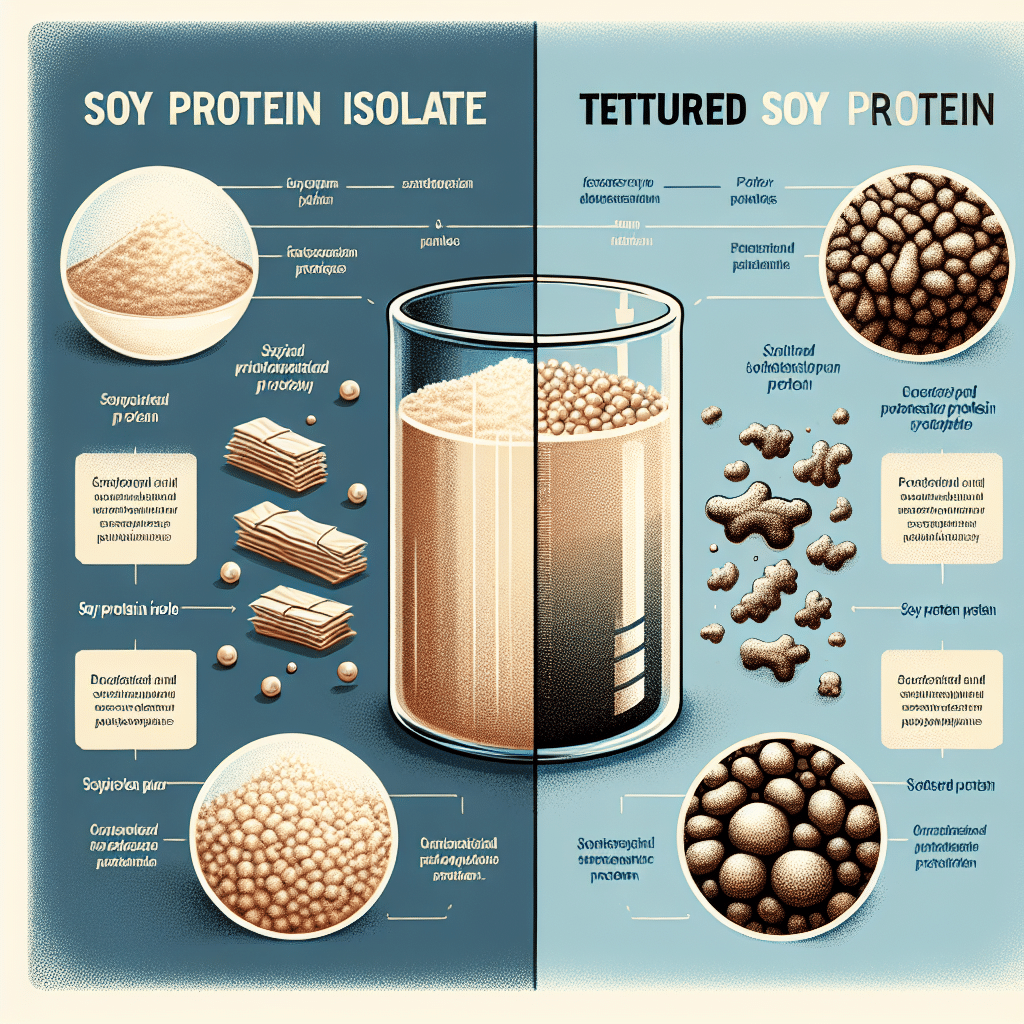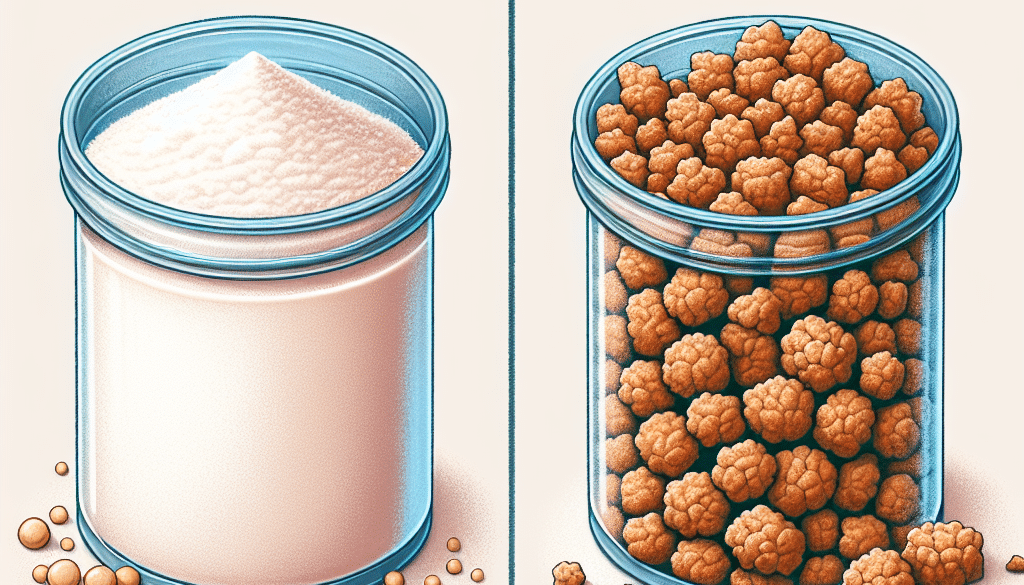What Is The Differehce Between Soy Protein Isolate And Textured Soy Protein?
-
Table of Contents
- Soy Protein Isolate vs. Textured Soy Protein: Understanding the Differences
- What is Soy Protein Isolate?
- What is Textured Soy Protein?
- Comparing Soy Protein Isolate and Textured Soy Protein
- Processing and Production
- Nutritional Content
- Culinary Uses
- Health Considerations
- Environmental Impact
- Conclusion: Choosing the Right Soy Protein for Your Needs
- Discover ETprotein’s High-Quality Soy Proteins
Soy Protein Isolate vs. Textured Soy Protein: Understanding the Differences

Soy protein has become a staple in the diets of many health-conscious individuals and vegetarians alike. Its versatility and nutritional profile make it an attractive alternative to animal proteins. However, not all soy protein products are created equal. Two popular forms of soy protein are soy protein isolate and textured soy protein. While they both originate from the same source, their processing, nutritional content, and culinary uses differ significantly. This article will delve into the distinctions between soy protein isolate and textured soy protein, providing valuable insights for consumers and food manufacturers.
What is Soy Protein Isolate?
Soy protein isolate is a highly refined form of soy protein that is extracted from defatted soy flour. It is processed to remove most of the fats and carbohydrates, resulting in a product that is at least 90% protein by weight. This makes it one of the purest forms of plant-based protein available on the market.
- Processing: The process of making soy protein isolate involves washing the soybeans with either alcohol or water to remove sugars and dietary fiber. The remaining protein is then dried and powdered.
- Nutritional Profile: Soy protein isolate is low in fat and carbohydrates, making it a popular choice for those looking to increase their protein intake without additional calories from fats or sugars.
- Uses: Due to its neutral flavor and high protein content, soy protein isolate is commonly used in protein shakes, meal replacement products, and protein bars. It is also used as an additive in various processed foods to enhance their protein content.
What is Textured Soy Protein?
Textured soy protein (TSP), also known as textured vegetable protein (TVP), is a meat substitute made from defatted soy flour, a by-product of soybean oil extraction. It is cooked under pressure and then extruded into various shapes and sizes, such as granules, chunks, or flakes.
- Processing: The production of TSP involves a process called extrusion cooking, which gives it a fibrous, spongy texture that closely resembles cooked ground meat.
- Nutritional Profile: Textured soy protein is rich in proteins and dietary fibers. It also retains more of the original soybean’s nutrients compared to soy protein isolate.
- Uses: TSP is often used as a meat extender or substitute in a variety of dishes, including chili, tacos, burgers, and stews. Its ability to absorb flavors makes it a versatile ingredient in the kitchen.
Comparing Soy Protein Isolate and Textured Soy Protein
When choosing between soy protein isolate and textured soy protein, it’s essential to consider their differences in processing, nutritional content, and culinary applications.
Processing and Production
Soy protein isolate undergoes a more intensive processing method to remove fats and carbohydrates, resulting in a higher protein concentration. In contrast, textured soy protein retains more of the soybean’s original components, including fibers and other nutrients, due to its less rigorous processing.
Nutritional Content
While both are excellent sources of protein, soy protein isolate is almost purely protein, making it suitable for those who require a concentrated protein source. Textured soy protein offers a more balanced nutritional profile, with additional fibers and nutrients that may be beneficial for overall health.
Culinary Uses
The neutral taste of soy protein isolate makes it a versatile additive for increasing protein content without affecting flavor. Textured soy protein, with its meat-like texture, is ideal for those seeking a plant-based meat alternative that can mimic the texture and mouthfeel of animal proteins.
Health Considerations
Both soy protein isolate and textured soy protein are considered safe for most people when consumed as part of a balanced diet. However, individuals with soy allergies should avoid both products. It’s also worth noting that some concerns have been raised about the potential health effects of consuming highly processed soy products, though research is ongoing.
Environmental Impact
The production of soy protein, whether isolate or textured, has environmental implications. Soy cultivation can lead to deforestation and habitat loss if not managed sustainably. Consumers interested in the environmental impact of their food choices should look for soy products that are certified organic or non-GMO and sourced from sustainable farming practices.
Conclusion: Choosing the Right Soy Protein for Your Needs
Understanding the differences between soy protein isolate and textured soy protein is crucial for making informed dietary choices. Soy protein isolate is best for those seeking a high-protein, low-fat supplement, while textured soy protein is ideal for replacing meat in various dishes. Both forms of soy protein offer nutritional benefits and can be part of a healthy diet when consumed in moderation.
Discover ETprotein’s High-Quality Soy Proteins
If you’re looking for premium soy protein products, ETprotein offers a range of options to meet your needs. Their soy protein isolates and textured soy proteins are produced with quality and sustainability in mind, ensuring you receive the best plant-based proteins for your health and culinary endeavors.
About ETprotein:
ETprotein, a reputable protein and L-(+)-Ergothioneine (EGT) Chinese factory manufacturer and supplier, is renowned for producing, stocking, exporting, and delivering the highest quality organic bulk vegan proteins and L-(+)-Ergothioneine. They include Organic rice protein, clear rice protein, pea protein, clear pea protein, watermelon seed protein, pumpkin seed protein, sunflower seed protein, mung bean protein, peanut protein, and L-(+)-Ergothioneine EGT Pharmaceutical grade, L-(+)-Ergothioneine EGT food grade, L-(+)-Ergothioneine EGT cosmetic grade, L-(+)-Ergothioneine EGT reference grade and L-(+)-Ergothioneine EGT standard. Their offerings, characterized by a neutral taste, non-GMO, allergen-free attributes, with L-(+)-Ergothioneine purity over 98%, 99%, cater to a diverse range of industries. They serve nutraceutical, pharmaceutical, cosmeceutical, veterinary, as well as food and beverage finished product distributors, traders, and manufacturers across Europe, USA, Canada, Australia, Thailand, Japan, Korea, Brazil, and Chile, among others.
ETprotein specialization includes exporting and delivering tailor-made protein powder and finished nutritional supplements. Their extensive product range covers sectors like Food and Beverage, Sports Nutrition, Weight Management, Dietary Supplements, Health and Wellness Products, and Infant Formula, ensuring comprehensive solutions to meet all your protein needs.
As a trusted company by leading global food and beverage brands and Fortune 500 companies, ETprotein reinforces China’s reputation in the global arena. For more information or to sample their products, please contact them and email sales(at)ETprotein.com today.














